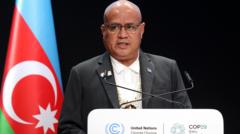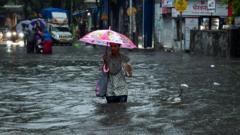The introduction of cash machines in Tuvalu signifies not only a shift towards modernization but also a commitment to empowering its 11,000 residents economically, as the nation tackles the challenges posed by climate change.
Tuvalu Makes Banking History with First Cash Machines

Tuvalu Makes Banking History with First Cash Machines
Tiny Pacific Island Takes a Major Step Towards Electronic Banking
In a landmark ceremony, Tuvalu officially launched its first-ever cash machines, marking a significant advancement in the banking capabilities of the small island nation. With a population of just 11,000, this introduction represents a new era in accessibility to electronic banking for Tuvaluans.
Prime Minister Feleti Teo described the occasion as momentous, highlighting that the nation has transitioned from a primarily analog banking system. "These machines don't come cheap," he noted, emphasizing the government's dedication to making electronic banking a reality through support and determination.
The installation includes five cash machines and 30 point-of-sale terminals located in Funafuti, the capital, including at its airport, which will facilitate both cash withdrawals and electronic transactions for local businesses. Currently, the ATM service accepts only prepaid cards, but the National Bank of Tuvalu plans to expand the service to include debit and credit cards usable internationally in the future.
The launch event, held at the National Bank’s headquarters in Vaiaku, saw attendance from traditional leaders, parliament members, and the business community, united in celebration of this significant step forward. Until now, residents had to queue outside banks for cash, often leading to long waiting times on paydays.
Head of the National Bank, Siose Penitala Teo, emphasized that this move toward electronic banking is essential for economic empowerment in the face of the existential threat that climate change poses to Tuvalu, with predictions that rising sea levels could ultimately submerge the islands. As noted during his statement at the recent COP29 Climate Conference, Teo's advocacy serves as a crucial reminder of the urgency to address such environmental challenges.




















